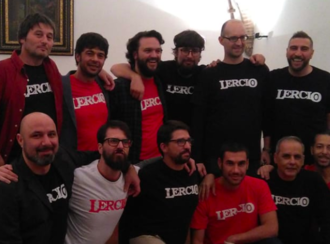
Satire is a genre of the visual, literary, and performing arts, usually in the form of fiction and less frequently non-fiction, in which vices, follies, abuses, and shortcomings are held up to ridicule, often with the intent of exposing or shaming the perceived flaws of individuals, corporations, government, or society itself into improvement. Although satire is usually meant to be humorous, its greater purpose is often constructive social criticism, using wit to draw attention to both particular and wider issues in society.

Black comedy, also known as black humor, bleak comedy, dark comedy, dark humor, gallows humor or morbid humor, is a style of comedy that makes light of subject matter that is generally considered taboo, particularly subjects that are normally considered serious or painful to discuss. Writers and comedians often use it as a tool for exploring vulgar issues by provoking discomfort, serious thought, and amusement for their audience. Thus, in fiction, for example, the term black comedy can also refer to a genre in which dark humor is a core component. Cartoonist Charles Addams was famous for such humor, e.g. depicting a boy decorating his bedroom with stolen warning signs including "NO DIVING – POOL EMPTY", "STOP – BRIDGE OUT" and "SPRING CONDEMNED."
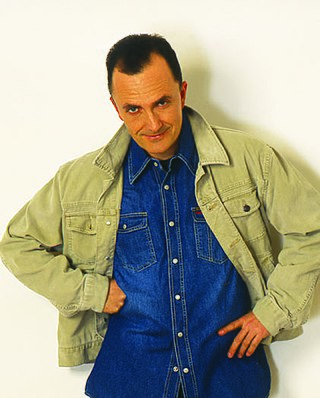
Daniele Luttazzi is an Italian theater actor, writer, satirist, illustrator and singer. His stage name is an homage to musician and actor Lelio Luttazzi. His favourite topics are politics, religion, sex and death.
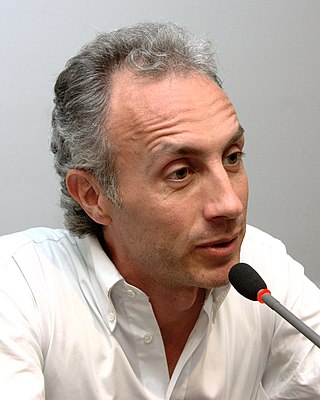
Marco Travaglio is an Italian journalist, writer, and pundit. Since 2015, he has been the editor-in-chief of the independent daily newspaper Il Fatto Quotidiano. Travaglio began his journalistic career in the late 1980s under Indro Montanelli at Il Giornale and La Voce, then in the 2000s worked at La Repubblica and L'Unità, before becoming one of the founders of Il Fatto Quotidiano in 2009. He is also the author of many books and a columnist for several other national newspapers and magazines, his main interests have been judicial reporting and current affairs and politics, dealing with issues ranging from the fight against the Italian Mafia to corruption.
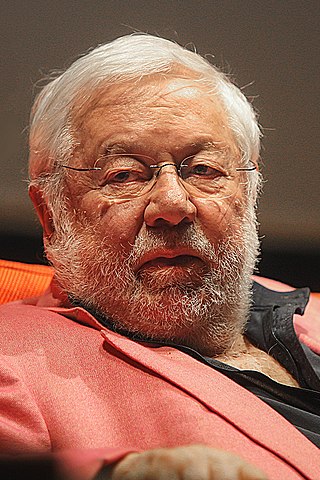
Paolo Villaggio was an Italian actor, writer, director and comedian. He is noted for the characters he created with paradoxical and grotesque characteristics: Professor Kranz, the ultra-timid Giandomenico Fracchia, and the obsequious and meek accountant Ugo Fantozzi, perhaps the favourite character in Italian comedy. He wrote several books, usually of satirical character. He also acted in dramatic roles, and appeared in several movies.

Sabina Guzzanti is an Italian satirist, actress, writer, and producer whose work is devoted to examining social and political life in Italy.

Franco Califano was an Italian lyricist, composer, singer-songwriter, author and actor. His songs sold about 20 million records during his career.
Mitì Vigliero Lami is an Italian journalist, writer, and poet. Born Maria Teresa Bianca Agata Anita in Turin, Italy, she has lived in Genoa since 1980.

Corrado Guzzanti is an Italian satirical actor, director, screenwriter, comedian and impersonator. He has become famous both for his impersonations of Italian personalities, and for playing his own characters inspired by contemporary society. He is the director of the film Fascisti su Marte. In 2010 he received the "Forte dei Marmi Political Satire Award". He has been described as a genius of satirical comedy, "the most interesting satirical author and actor today", and "among the comedians best loved by the Italian public".
Sick comedy was a term originally used by mainstream news weeklies Time and Life to distinguish a style of comedy/satire that was becoming popular in the United States in the late 1950s. Mainstream comic taste in the United States had favored more innocuous forms, such as the topical but inoffensive one-liners in Bob Hope's routines. In contrast, the new comedy favored observational monologues, often with elements of cynicism, social criticism and political satire.
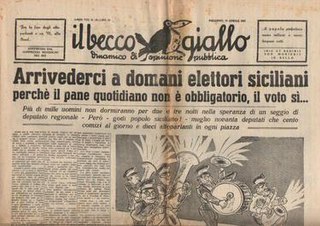
Il Becco Giallo was an antifascist satirical magazine in the 1920s in Italy. The magazine existed between 1924 and 1926.

Agim Sulaj is an Albanian painter, living in Rimini, Italy since 1990 and having Italian citizenship.

The Istituto Giannina Gaslini is the biggest pediatric hospital of North Italy, located in Genoa Quarto dei Mille and founded by the Italian industrialist, politician and philanthropist Gerolamo Gaslini in 1938.
This is a list of Italian television related events from 2001.

Roberto Burioni is an Italian virologist, physician, and academic. A Professor of Microbiology and Virology at the Vita-Salute San Raffaele University, he runs there a lab developing human monoclonal antibodies against human infectious agents, the study of pathogen-host interplay, and the use of molecular tools in the early diagnosis of infectious diseases. A prominent virologist, Burioni has risen to fame in Italy for his strong stance against the antivaccination movement and has been described as the "most famous virologist in Italy".

Claudia Lagona, better known by her stage name Levante, is an Italian singer-songwriter, novel writer and model. She rose to fame in the 2010s, publishing four albums and several media success singles and collaborations, reaching the top ten on the Italian Albums Chart three times. She has written songs for several Italian artists and has collaborated with Gianni Morandi, Irene Grandi, Max Gazzè, The Kolors, J-Ax, Tiziano Ferro and Carmen Consoli.

Guido Ceronetti was an Italian poet, philosopher, novelist, translator, journalist and playwright.

Antonio Ricci is an Italian television writer and showrunner.
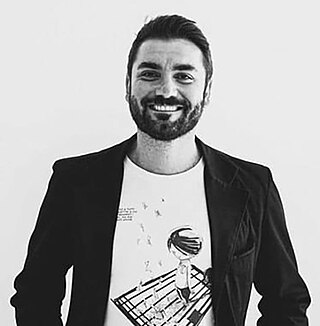
Lelio Bonaccorso, is an Italian comic artist and illustrator.
Davide Rondoni is an Italian poet and writer.

